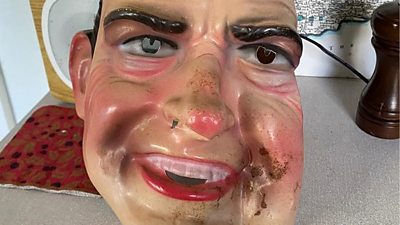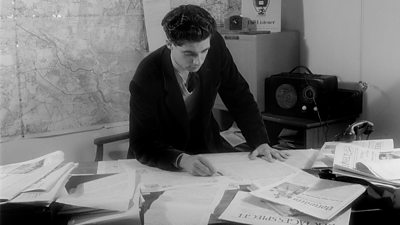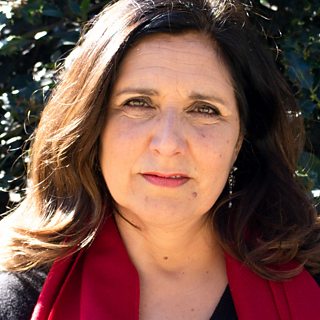Image: Charles Wheeler working on his eight part Road to War series. September 1989, BBC Two.
This is Charles Wheeler reporting from a telephone box in Central Avenue in Los Angeles...
Catapulted back
Listening back to my father’s voice reporting on such events as the 1965 Watts riots took a bit of resolve. More immediately evocative than a photograph, those very distinctive tones, 15 years after his death, might be too raw. But within seconds of clicking on “play”, the resistance was gone, as I was catapulted back into his company.
In writing and researching the story of his life, his journalism and what framed it, I’ve spent dozens of hours inside the BBC’s digital and written archives, poring over microfilm, listening to and watching Charles’s broadcasts from the late 1950s to his final one in 2008.
The flight of the Dalai Lama to India, the death of Peter Fechter at the Berlin Wall, Martin Luther King’s Freedom March in America's Northern cities, the Watergate Scandal, his 1990s reports on the plight of the Kurds and his late radio documentaries on postwar Britain and the Child Migrants - these mark an extraordinary career and a glimpse into some of the most significant moments of the second half of the 20th century.
Backdrop to my childhood
But along the way I’ve also revisited my own childhood. Looking at how he reported these stories has been a very personal journey . Charles’s career - posted to India, Berlin, America and Brussels - framed and determined my (and my sister’s) early years. We grew up with these stories as a distinct backdrop to our lives.
I still remember, as a five year old, sitting on the end of my parents’ bed the night Charles got back from covering the Democratic Convention in Chicago and told us what he’d seen - police running amok, truncheons raised, charging at demonstrators, delegates, residents and reporters alike, who all found themselves laid into, beaten and teargassed on the orders of Chicago’s Mayor Daley himself. The images are so vivid and they’ve lived with me ever since.
And then there was Nixon. Charles had strong views about him. One Hallowe’en in the 1970s he bought a grotesque Halloween mask of the President from our favourite five-and-dime store in downtown Washington. To him, it was a joke at Nixon’s expense. We, on the other hand, were terrified by it.

When Charles became Chief Europe Correspondent in 1973, he took the mask to Brussels and kept it to scare away any potential burglars, as he told us. By this time, he would occasionally read his radio stories to me before he phoned them through to London. I am not sure he expected a very profound understanding of the issues from me, but he would say that if I didn’t understand the words and phrases he was using, he was doing something wrong. As I later realised, it gave an insight into his journalistic technique, where clarity and precision were always paramount.
Brussels – 30 years apart
As it turned out, Charles and I were both posted in Brussels for the BBC - though with a 30-year interval between us. I presented the EU politics programme, Record Europe, for seven years from 2002, as Britain edged towards its fateful decision to leave the EU. But listening back to some of Charles’s reports just as Britain was pushing to renegotiate its relationship with what was then called the European Community in advance of the 1975 referendum, I was reminded just how chronically difficult the UK-EU relationship had been from the start and how similar the issues were to the ones I was covering in my programme. There they were: the UK’s demands for greater concessions and opt-outs, the worry that it was moving towards political union and, something Charles was very quick to identify and which would become all too familiar in the run up to the 2016 referendum, the thorny question of sovereignty.
History and journalism
What has struck me writing his story, is Charles’s instinctive sense of history and an uncomplicated understanding of how it sits with journalism. Looking back at his life before he joined the BBC in 1946 provides some answers. He was born 100 years ago, in 1923 in Bremen, and as a child witnessed first-hand the rise of Nazism before his family moved to England at the outset of war. His fluent German would serve him well in the coming conflict.
As a Royal Marines officer attached to 30 Assault Unit, a maverick naval intelligence commando created by none other than Ian Fleming, future author of the James Bond books, he operated behind enemy lines, gathering Intelligence and interrogating captured German naval officers.
Four years after joining the BBC ( a few months after he was demobbed), he was back in Germany, stationed in Berlin with the rather Cold War sounding title of “BBC liaison officer.” One of the great revelations of this project for me has been the extent of Charles’s own personal archive: one day I found, in a shoebox, a pile of dispatches he’d written between 1952-1954 for the German Service of the BBC, all of them previously thought lost. These dispatches chart the gradual tightening of the East German regime on the daily lives of its inhabitants and the emergence of a system that looked worryingly familiar to him.

From a pro-Soviet rally in Leipzig in June 1952, he wrote, “Thousands of young voices raised in praise of a dictator, political slogans shouted in chorus, rhythmic clapping, stamping feet and marching to arms. The people of Leipzig had seen it all before. Only the names had changed – a foreign dictator this time – and brownshirts had given way to blue”.
Charles’s voice
Among the most important stories Charles felt he did were in the aftermath of the first Gulf War that may have helped to bring about the no-fly zone to protect the Kurds and to tell the world about the plight of the Palestinians and migrant workers, neglected and persecuted after the Iraqi withdrawal from Kuwait.
Looking back at those TV reports I am struck by the body language and the power of this image.
Charles was a very interesting mix: supremely self-confident, definitely bloody-minded and yet innately modest. He was entirely unintimidated by bullies, whether in uniform, in government or in the form of BBC managers. But he could be very gentle and in these stories you see how he places himself at the same level as the young migrant men, or at the feet of the young Kurdish mother and her child.
The reporter holds the powerful to account whoever they might be and gives a voice to the vulnerable, wherever they are. In these troubling times I think today’s journalists - perhaps all of us - have something important to take from this.
After more than 20 years of on-air reporting with BBC TV and Radio, Shirin Wheeler now works in the world of European public policy and finance.
Her book about her father - Charles Wheeler: Witness to the Twentieth Century - is published on 9 November 2023 by Manilla Press.
Shirin is also a board member of Global Girl Media UK which provides digital media training and mentoring to girls and young women in front of and behind the camera.
Share your memories
Tell us what you recall of Charles Wheeler's work for BBC TV and radio. Did his reports move, inform, or even educate and entertain? What are your highlights of BBC reporting and journalism?
BBC terms and conditions
We aim to read all of your emails but due to the numbers we receive each day it is not always possible to reply to everyone individually.
In some cases your images or audio may be used on BBC output.
If we use your material on BBC programmes or online we will publish your name as you provide it (unless you ask us not to) but we will never publish your email address.
If you are happy to be contacted by a BBC journalist please leave a telephone number that we can contact you on. In some cases a selection of your comments will be published, displaying your name as you provide it and location, unless you state otherwise. Your contact details will never be published. When sending us pictures, video or eyewitness accounts at no time should you endanger yourself or others, take any unnecessary risks or infringe any laws.
Please ensure you have read the terms and conditions.

